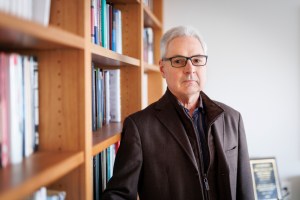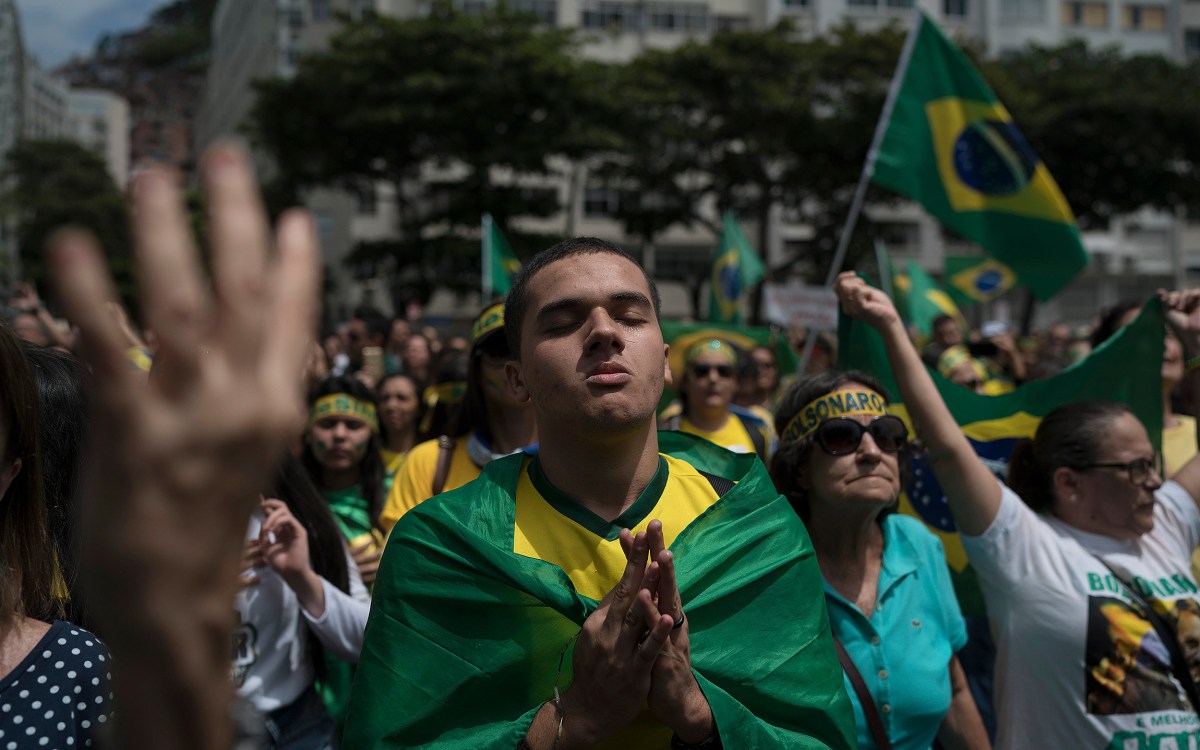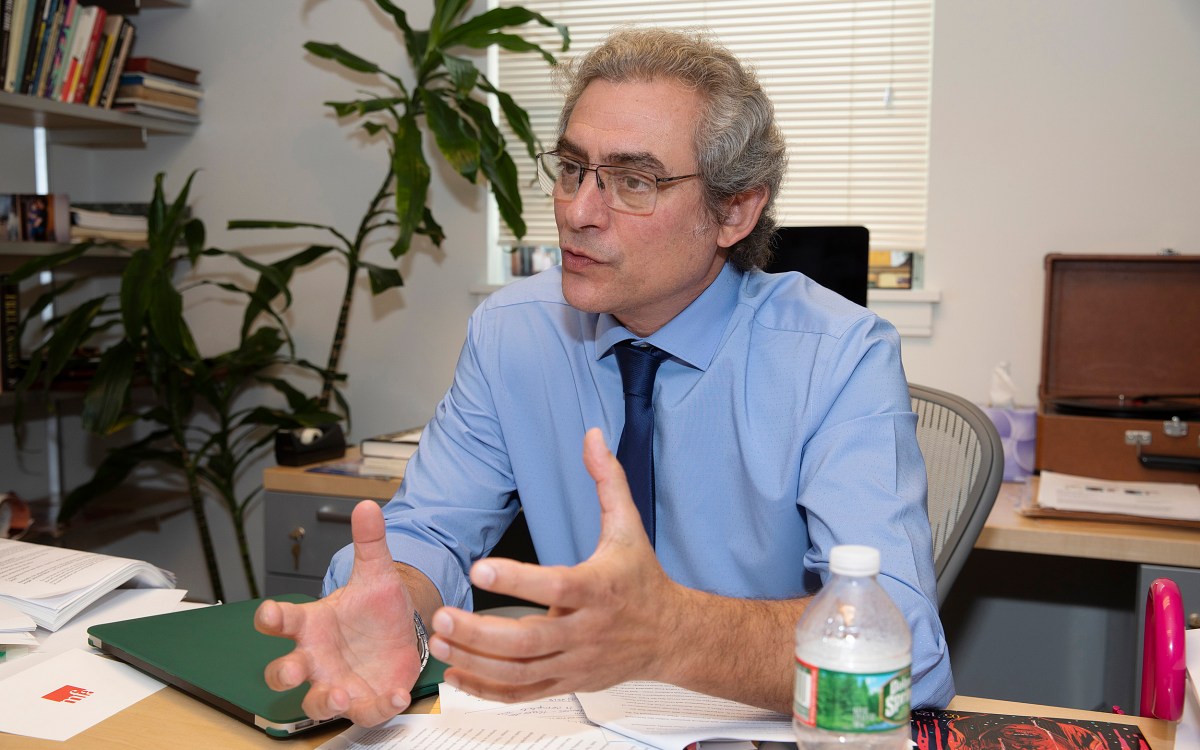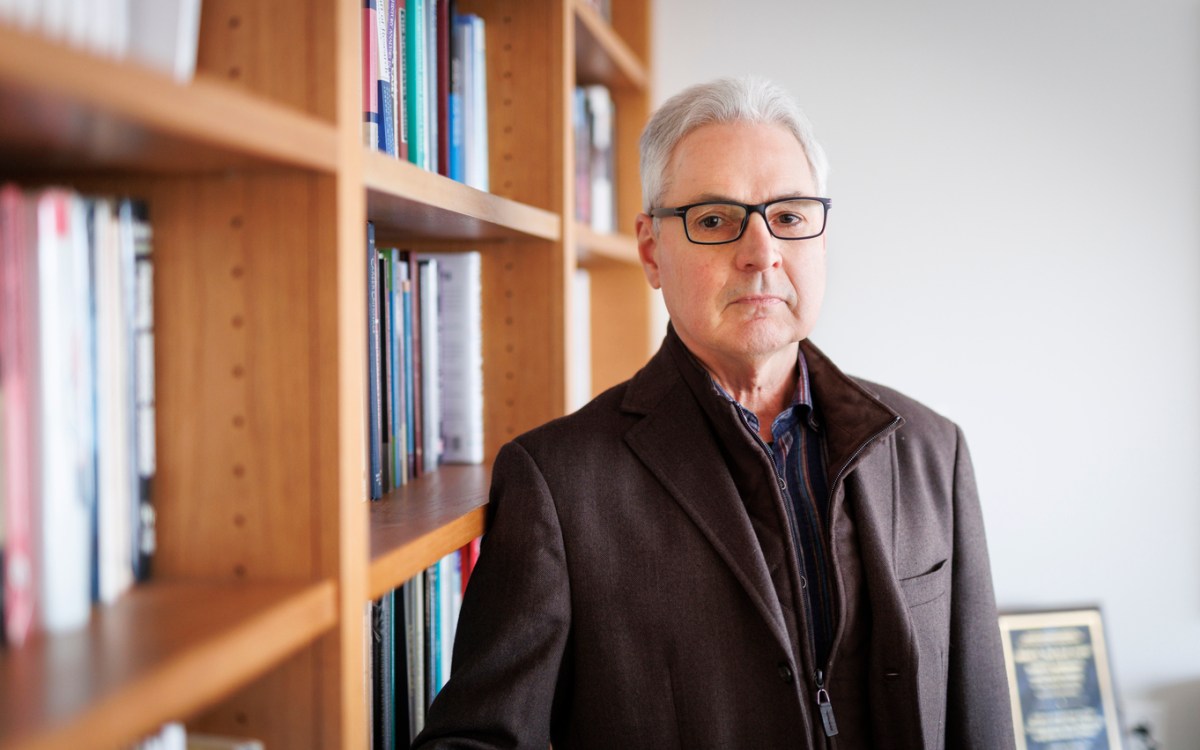A prophet of peace
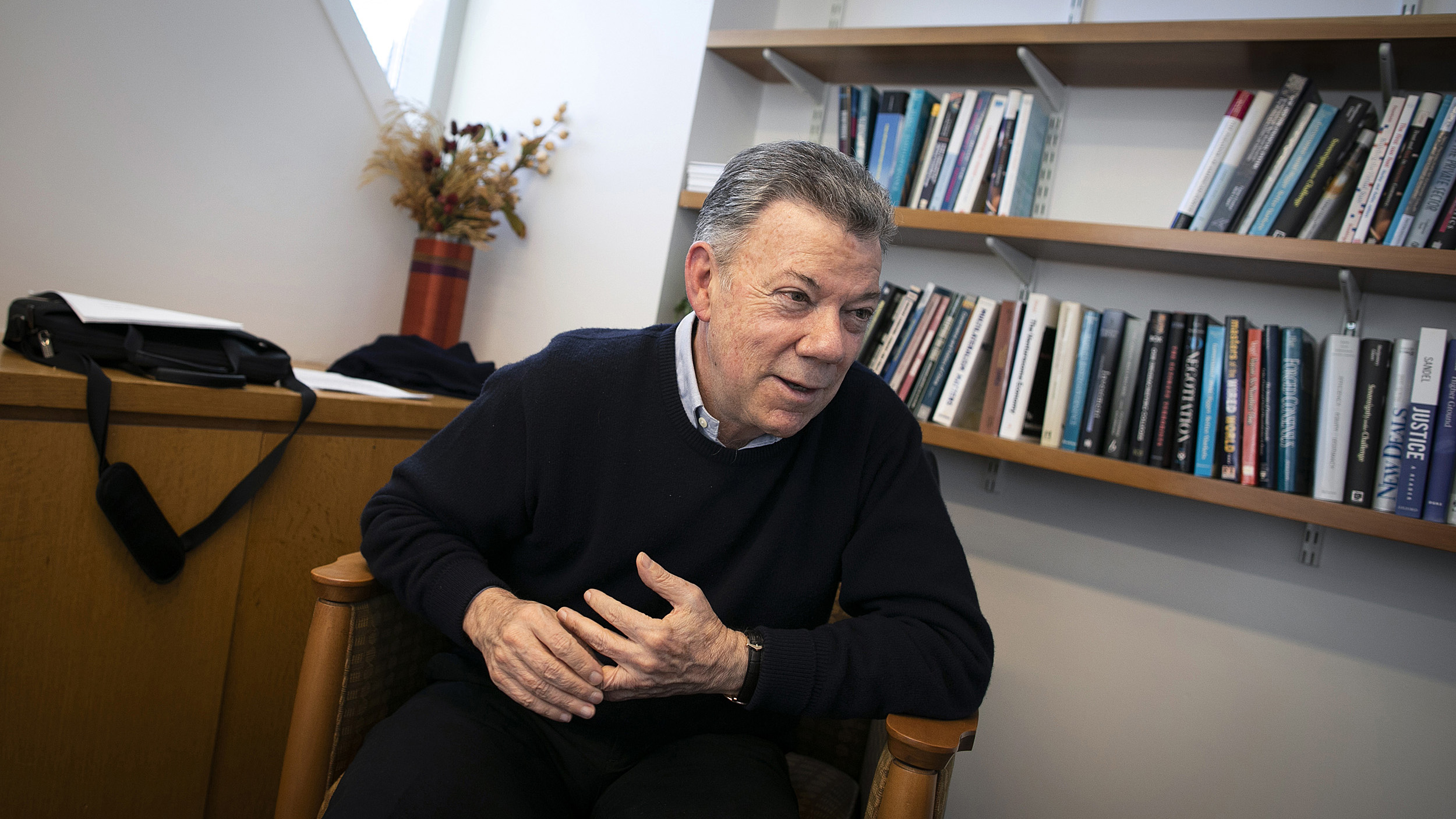
“You have to build peace by persuasion and consensus. During war, you build support simply because it’s a matter of life and death,” says former Colombian president Juan Manuel Santos.
Stephanie Mitchell/Harvard Staff Photographer
Juan Manuel Santos, who won the Nobel for stabilizing Colombia, is back at Harvard to share what he learned
Juan Manuel Santos, the former president of Colombia and 2016 Nobel Peace Prize winner for his efforts to end more than 50 years of civil war in his country, has returned to Harvard.
This year, Santos is the Angelopoulos Global Public Leaders Fellow at Harvard Kennedy School (HKS), where he is sharing the lessons he learned as president and working on issues related to peace and reconciliation, poverty, human rights, and the environment.
Santos earned a mid-career master’s in public administration from HKS in 1981. He also was a Nieman Fellow in 1988, a year he said he still considers the best of his life.
He recently sat down for an interview with the Gazette to talk about his future plans, his conversion from hawk to dove, and his successful efforts to bring peace to his Colombia.
Q&A
Juan Manuel Santos
GAZETTE: You are an economist, a journalist, and a politician. Which of these activities is your real vocation?
SANTOS: I would say all three of the above or none of the above [laughter]. I have discovered that my real vocation is to make the world better through the resolution of armed conflicts. It is a good cause, and it has become my passion. That’s why I started the peace process in Colombia. Peace is something the world needs on a permanent basis.
GAZETTE: For many Colombians, peace was an impossible dream for many years. When did you first think of the possibility of peace for Colombia?
SANTOS: I remember very well one day when I was hosting a conference as the minister of foreign trade [1991–1994] in Bogota, and in the middle of the conference, a big bomb exploded. The event’s goal was to attract foreign investment to my country, but people who participated in the conference said to me “There is no way we can invest in Colombia unless you stop this war.” Sometime later [in 1996], I went to South Africa as the president of the eighth session of the U.N. Conference on Trade and Development. I had scheduled a 15-minute meeting with Nelson Mandela, but we spent more than six hours talking about our countries. He told me that as long as Colombians didn’t end the war, my country wasn’t going to become a developed country. In a way, that’s when I found my destiny: to fight for peace in my country.
GAZETTE: But as defense minister between 2006 and 2009, you led military operations against the FARC rebels that were successful. And because of that, Colombians elected you as president in 2010. How did your conversion from hawk to dove develop?
SANTOS: It was very difficult from a political point of view. They warned me, “You’re going to lose your political capital.” They said, “You were elected because you were an effective hawk and suddenly you want to sit down with the FARC and become a dove. Nobody is going to understand this.” It was indeed very difficult to understand, but I knew it was the only way to finish the war. Many times during this process, I thought of Winston Churchill, whom I admire. He said once, “Do the right thing, not the popular thing.” I was also convinced of the necessity of peace because I was not a hawk for the sake of being a hawk. I was a hawk because I knew that one necessary condition for a successful peace process was to weaken the FARC militarily so that they wouldn’t have the possibility of winning through armed struggle. And that’s what we did. The military struggle was the first step toward peace.
GAZETTE: You have said that war is easier than peace. How did you discover that?
SANTOS: To lead in times of war is much easier than to lead in times of peace. I discovered that because I was very effective making war. That’s why they elected me for the first time with the highest number of votes in the history of Colombia. But being an effective war leader requires a type of leadership that is very simple. You give orders, you rally the people around you and denigrate your opponents, or those who are confronting you, and that’s easy, provided that you don’t lose. Making peace requires a completely different type of leadership. Instead of giving orders, you need to convince, to persuade, to change people’s sentiments, to teach them how to forgive, how to reconcile, and that’s much more difficult. You have to build peace by persuasion and consensus. During war, you build support simply because it’s a matter of life and death.
GAZETTE: You were re-elected in 2014, and in 2016, Colombians rejected the peace agreement between your government and the rebels in a referendum. How did you make sense of their rejection?
SANTOS: I was quite shocked by the results of the referendum. We didn’t expect it. But what happened, and this, we understood later on, was part of the political polarization that is going on in Colombia and everywhere around the world. The Brexit vote had happened two weeks before the referendum, and there was a political campaign by opponents of the peace agreement that spread false information, fake news, and instilled fear among voters about the peace process. I underestimated the power of fake news. The things they said were so egregious that I thought nobody would believe them. I was wrong. But in the end, I decided to find an opportunity in the crisis, and we ended up with a better, stronger agreement that is now being implemented.
GAZETTE: The referendum took place on Oct. 2, and five days later, on Oct. 7, you were awarded the Nobel Peace Prize. What role do you think the Nobel Prize played in the development of the peace process?
SANTOS: First, I didn’t expect it. As a matter of fact, my son called me in the morning and said to me, “Dad, you just won the Nobel Peace Prize,” and I said, “Thank you; call me later.” I was completely asleep. I realized later on what a magnificent thing it was. The Nobel Peace Prize gave a big push to the peace process. It was the best demonstration of the support of the international community for peace. That’s how Colombians interpreted it. It was like a gift of God.
“Wounds take time to heal, and you have to teach people how to live without hate, how to live with a tolerant perspective of the differences, and how to reconcile with people you had seen as enemies for centuries.”
GAZETTE: The peace agreement was finally signed in November of 2016. What’s your involvement with the peace process and its implementation?
SANTOS: I’ve retired from active politics. But the implementation of the peace process is very important and also more difficult. One thing is peace-making, which we did successfully. Another thing is peace-building, which is like building a cathedral, brick by brick. It’s a slow process. Wounds take time to heal, and you have to teach people how to live without hate, how to live with a tolerant perspective of the differences, and how to reconcile with people you had seen as enemies for centuries. This is a project that takes time. That’s why the Pope went to Colombia last year and not before. He, very wisely, said to me, “I would go when I would be most needed,” and he went after we signed the peace agreement. He came to Colombia to push Colombians to take the first step to reconciliation. It’s a long march.
GAZETTE: Where did you find inspiration for peace? You mentioned Mandela, Churchill. What other historical figures do you admire?
SANTOS: I’m a big fan of biographies. I’ve read almost every book about Winston Churchill. Abraham Lincoln is another historical figure I admire for his leadership and his will to persevere to defend the Union. I also admire Franklin D. Roosevelt because he changed the country for the better.
GAZETTE: What’s your biggest regret as president?
SANTOS: This happens to every well-intentioned head of state. We experience a great deal of frustration when we look back and think, “I could have done more.” I think we did a lot, besides achieving peace. Colombia managed to decrease poverty more than any other country in Latin America, and we managed to strengthen our economy. We also launched a very aggressive policy to fight climate change and protect our biodiversity. This is one of the big assets Colombia and all the Amazon countries have. But you always look back and say, “I could have done more.” Other regrets I have are that there are too many poor people in Colombia, the inequality is very high, and the destruction of the forest is still going on.
GAZETTE: You have also said that one of your regrets is not having been able to leave a united country, but a divided country.
SANTOS: I have fought a lot, in the good sense of the word, to try to find common ground with my opponents, but I had an implacable opposition. I wanted to build bridges because I know how destructive polarization is, and we’re seeing its negative impact all around the world. One of my big regrets is indeed not having been able to unite the country even around something as important as peace. It seems illogical and absurd. There is no bad peace or good war in the history of humanity. But unfortunately the country was divided around peace.
GAZETTE: What are your plans for your post-presidential life?
SANTOS: I have said many times that the best year of my life was my year as a Nieman Fellow. I’ve been here as the Angelopoulos Fellow after leaving the presidency of Colombia, and I’ve been very happy, and if this degree of happiness continues, I’ll have another best year of my life. It’s an enormous opportunity. The most important decision you have to make is what conference or what class you are going to go to today. It is the ideal world.
I’m here at Harvard exploring possibilities to work on three areas: peace and resolution of armed conflicts, climate change, and fighting poverty. I would also like to help Harvard make more proactive efforts to try to neutralize the polarization that the country and the world are experiencing at this moment, and find ways to close the gaps between the extremes that are growing deeper here and everywhere else in the world. I hope I can contribute to those efforts.
This interview has been edited for clarity and length.


